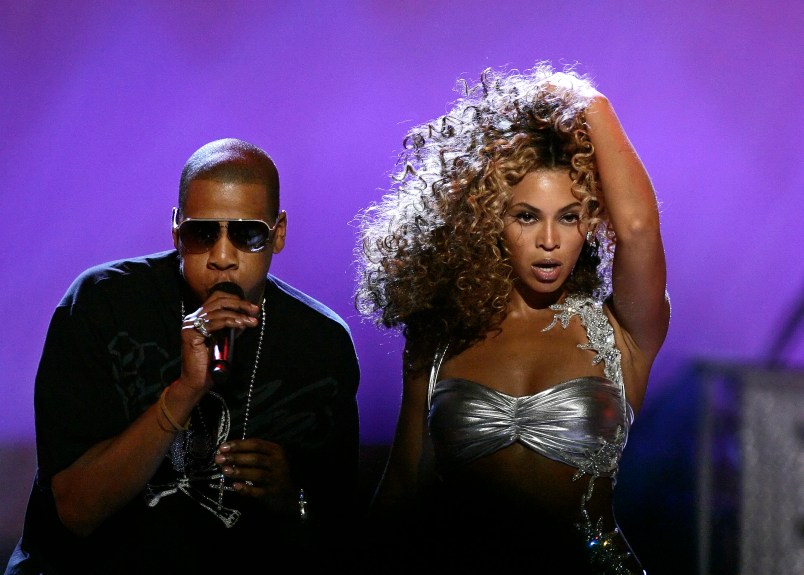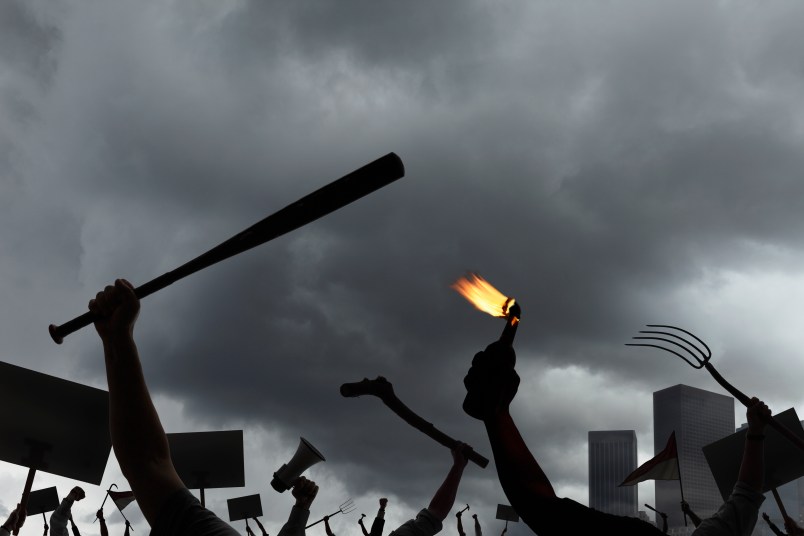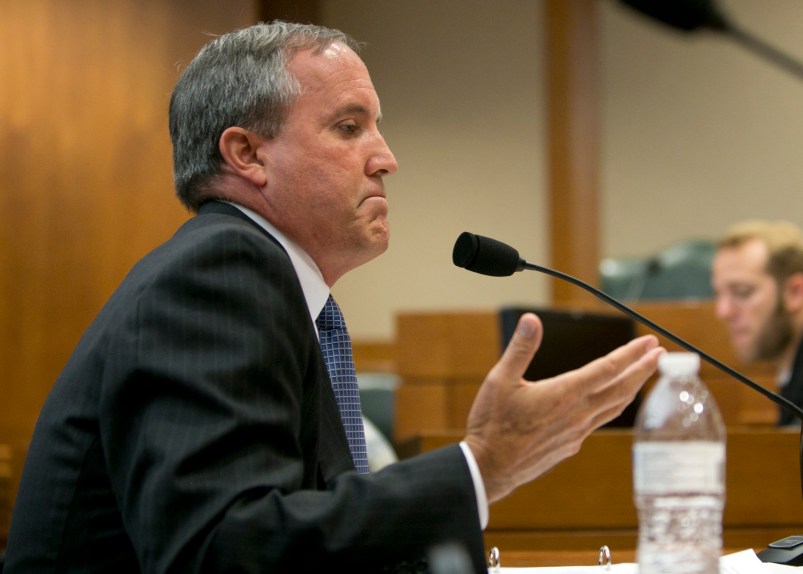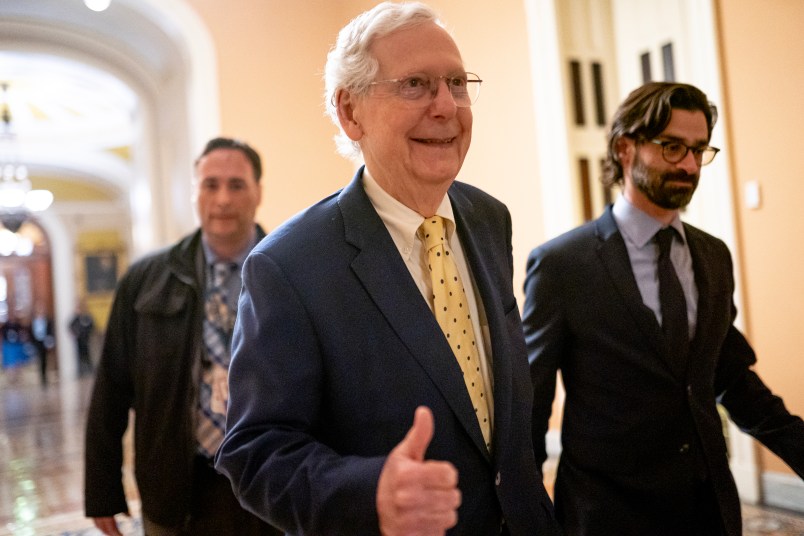The image is indelible now — a bespangled and confident Beyonce, microphone in hand, standing before a light display that emblazoned the controversial word “FEMINIST” across the stage. As the ubiquitous performer, fresh off her co-headlining “On the Run” tour, presided over the crowd, she was joined by family. Her husband, Jay-Z held their often-hidden daughter Blue Ivy on his lap as she performed, and the Carter family embraced warmly after her performance as Mr. Carter presented his wife with her Video Vanguard Award. So much has been said about Beyonce’s role in the recent resurgence of the feminist movement. But far less has been said about the idea that Jay-Z could also be a feminist.
Beyonce The Feminist. Next @OnPointRadio http://t.co/3HO8Ipn8on
w/ @rgay, @JessicaValenti and @digtanya pic.twitter.com/2BMldvpdkf
— Tom Ashbrook (@tomashbrooknpr) August 29, 2014
Male feminism is often viewed as a mythical or unreasonable concept, a display of privilege seen as insincere. But in its purest, least cynical form, it is the belief that men and women should be treated equally in all walks of life. Men like Joseph Gordon-Levitt, Jon Hamm, and John Legend have been lauded for their “progressive” views that value women as equals; Jay-Z has thus far avoided that classification. But in an industry and genre that often seems sharply at odds with such a concept, it should be all the more evident that here, as in many other areas, Mr. Carter is doing something quite different.
On Jay-Z’s 2006 effort Kingdom Come, the song “Lost One” featured a verse in which he appeared to struggle with the power of his then-girlfriend’s fame: “I don’t think it’s meant to be, B / But she loves her work more than she does me / And honestly, at 23 / I would probably love my work more than I did she.” He acknowledged a few years later that this verse was about Beyonce and the challenges of being with someone so ambitious. But his reasoning ultimately demonstrates his respect for her hustle:
These lines are about trying to have a real, serious relationship with another ambitious professional. In a lot of ways, this is the flip side of the songs in my catalog like “Big Pimpin’,” where women exist almost completely as predators or objects. This is about how difficult it is to respect a lover as an autonomous human being, with separate needs and goals and timelines than yours. It’s one of the hardest things about a real relationship of equals. But it’s worth it. (emphasis added)
And yes, with songs in his repertoire like “Big Pimpin’,” it can be hard to dismiss the idea that Jay-Z harbors feminist tendencies. But along with adjectives like “business-minded,” “prolific” and “talented,” an adjective that comes up frequently when the press discuss Jay-Z? Authentic. Esquire once termed him “the CEO of authenticity.” Consider the juxtaposition of images that was featured on his and Beyonce’s stage show for the On the Run tour:
Before the concert, and also whenever a gun fires on screen, a message flashes: “THIS IS NOT REAL LIFE.” But during the final few songs, tributes to marriage and parenthood, home movies with Blue Ivy play, and the message changes: “THIS IS REAL LIFE.”
Jay-Z takes being a good partner and family man seriously, as seriously as he does the work that he does with Def Jam and Roc-a-Fella. In fact, he has previously referred to those efforts as a means to get him to a place where family and his relationship could take the spotlight. In an industry that is often maligned for its glorification of a starkly different relationship to family, his desire to be seen as an equal in his relationship (earlier interviews featured him pondering his impending role as a father, and visible excitement over the idea of car seats and diaper changing) stands out.
It’s worth noting that Jay-Z graced the stage to present his wife with an award, and less than 24 hours later Sofia Vergara was placed on a rotating platform in a widely panned gag at the Emmys. As I compared the two scenarios in my head, I couldn’t help but recall the Chimamanda Ngozi Adichie quote that is oft-cited as an inspiration for Beyonce:
We teach girls to shrink themselves to make themselves smaller. We say to girls, you can have ambition, but not too much. Aim to be successful, but not too successful; otherwise, you will threaten the man.
What does it say that two powerful women (remember, Vergara is a producer and clothing line owner as well as actress) took such drastically different roles in the spotlight within the span of 48 hours? And, perhaps more importantly, what does it say that one of the most powerful men in entertainment was prominently involved in the former?
Amma Marfo is a writer, higher education administrator, and popular culture enthusiast dedicated to the idea that our leisure pursuits can inform and enrich the work we do. She writes often for her own blog (“The Dedicated Amateur“) and is a contributing editor to the Niche Movement. Her first book, THE I’S HAVE IT: Reflections on Introversion in Student Affairs, was released in January 2014. Her other interests include running, yoga, surfing, trivia, comedy, and gluten-free cooking/baking. You can follow her on Twitter @ammamarfo.










